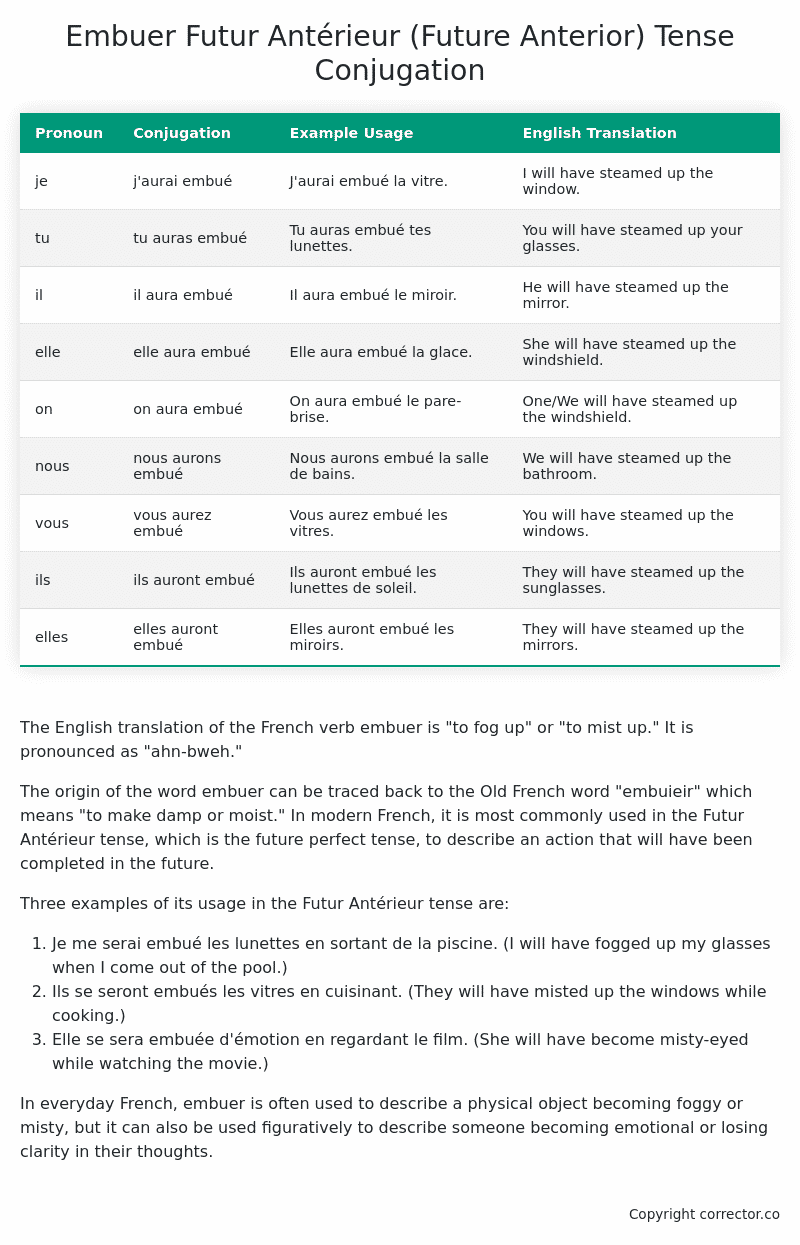Futur Antérieur (Future Anterior) Tense Conjugation of the French Verb embuer
Introduction to the verb embuer
The English translation of the French verb embuer is “to fog up” or “to mist up.” It is pronounced as “ahn-bweh.”
The origin of the word embuer can be traced back to the Old French word “embuieir” which means “to make damp or moist.” In modern French, it is most commonly used in the Futur Antérieur tense, which is the future perfect tense, to describe an action that will have been completed in the future.
Three examples of its usage in the Futur Antérieur tense are:
- Je me serai embué les lunettes en sortant de la piscine. (I will have fogged up my glasses when I come out of the pool.)
- Ils se seront embués les vitres en cuisinant. (They will have misted up the windows while cooking.)
- Elle se sera embuée d’émotion en regardant le film. (She will have become misty-eyed while watching the movie.)
In everyday French, embuer is often used to describe a physical object becoming foggy or misty, but it can also be used figuratively to describe someone becoming emotional or losing clarity in their thoughts.
Table of the Futur Antérieur (Future Anterior) Tense Conjugation of embuer
| Pronoun | Conjugation | Example Usage | English Translation |
|---|---|---|---|
| je | j’aurai embué | J’aurai embué la vitre. | I will have steamed up the window. |
| tu | tu auras embué | Tu auras embué tes lunettes. | You will have steamed up your glasses. |
| il | il aura embué | Il aura embué le miroir. | He will have steamed up the mirror. |
| elle | elle aura embué | Elle aura embué la glace. | She will have steamed up the windshield. |
| on | on aura embué | On aura embué le pare-brise. | One/We will have steamed up the windshield. |
| nous | nous aurons embué | Nous aurons embué la salle de bains. | We will have steamed up the bathroom. |
| vous | vous aurez embué | Vous aurez embué les vitres. | You will have steamed up the windows. |
| ils | ils auront embué | Ils auront embué les lunettes de soleil. | They will have steamed up the sunglasses. |
| elles | elles auront embué | Elles auront embué les miroirs. | They will have steamed up the mirrors. |
Other Conjugations for Embuer.
Le Present (Present Tense) Conjugation of the French Verb embuer
Imparfait (Imperfect) Tense Conjugation of the French Verb embuer
Passé Simple (Simple Past) Tense Conjugation of the French Verb embuer
Passé Composé (Present Perfect) Tense Conjugation of the French Verb embuer
Futur Simple (Simple Future) Tense Conjugation of the French Verb embuer
Futur Proche (Near Future) Tense Conjugation of the French Verb embuer
Plus-que-parfait (Pluperfect) Tense Conjugation of the French Verb embuer
Passé Antérieur (Past Anterior) Tense Conjugation of the French Verb embuer
Futur Antérieur (Future Anterior) Tense Conjugation of the French Verb embuer (this article)
Subjonctif Présent (Subjunctive Present) Tense Conjugation of the French Verb embuer
Subjonctif Passé (Subjunctive Past) Tense Conjugation of the French Verb embuer
Subjonctif Imparfait (Subjunctive Imperfect) Tense Conjugation of the French Verb embuer
Subjonctif Plus-que-parfait (Subjunctive Pluperfect) Tense Conjugation of the French Verb embuer
Conditionnel Présent (Conditional Present) Tense Conjugation of the French Verb embuer
Conditionnel Passé (Conditional Past) Tense Conjugation of the French Verb embuer
L’impératif Présent (Imperative Present) Tense Conjugation of the French Verb embuer
L’infinitif Présent (Infinitive Present) Tense Conjugation of the French Verb embuer
Struggling with French verbs or the language in general? Why not use our free French Grammar Checker – no registration required!
Get a FREE Download Study Sheet of this Conjugation 🔥
Simply right click the image below, click “save image” and get your free reference for the embuer Futur Antérieur tense conjugation!

Embuer – About the French Futur Antérieur (Future Anterior) Tense
Construction
Common Everyday Usage Patterns
Interactions with Other Tenses
For example
Summary
I hope you enjoyed this article on the verb embuer. Still in a learning mood? Check out another TOTALLY random French verb conjugation!


